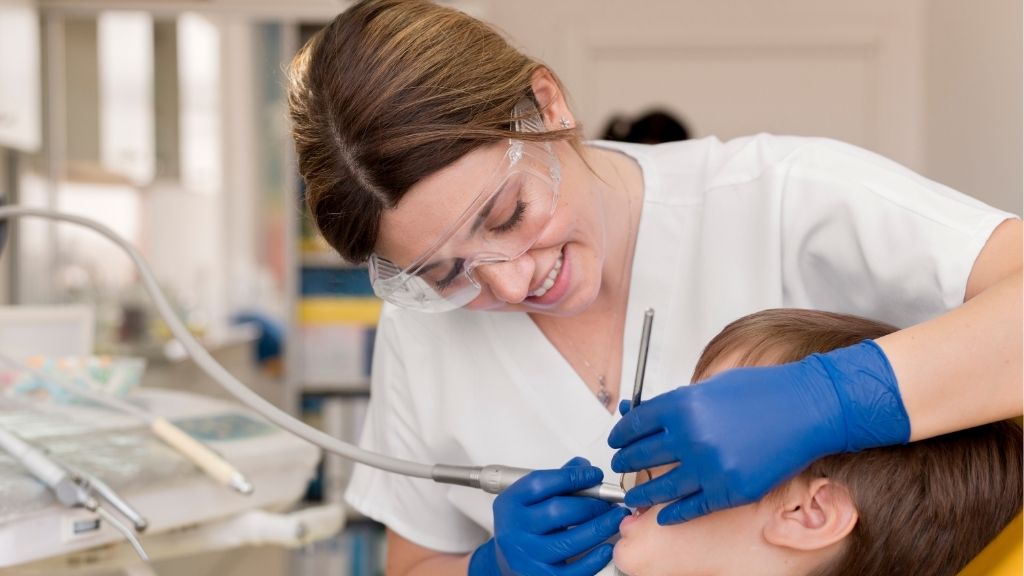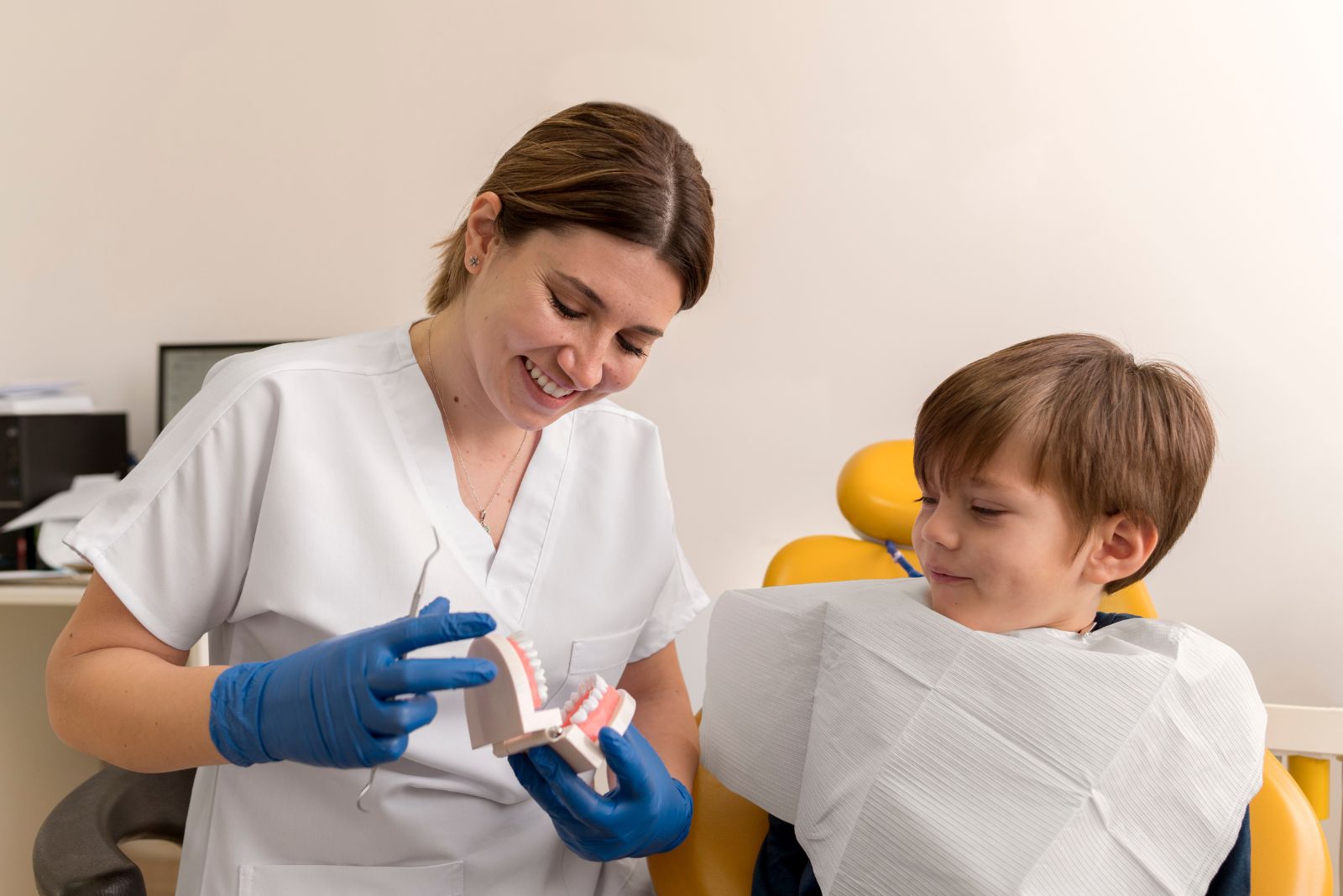Many parents in Methuen wonder when their child should first visit the dentist. It’s a small question with a big impact on a child’s lifelong dental health.
While baby teeth eventually fall out, they play a major role in your child’s development. They help your child speak clearly, chew food properly, and smile with confidence.
Healthy baby teeth also guide adult teeth into their correct positions. Caring for these early teeth lays the groundwork for strong, healthy adult teeth.
So, when exactly is the right time for that first dental visit? Let’s explore what dental experts recommend, what you can expect at the first appointment, and how to ensure the experience is a positive one for your child right here in Methuen.
Why Early Dental Visits Matter
Baby teeth are more than just temporary placeholders. They’re essential for proper chewing and speech development. When your child’s baby teeth stay healthy, their adult teeth have a much better chance of coming in straight and strong. But if problems like cavities, infections, or early tooth loss happen, they can affect how those adult teeth grow.
Tooth decay can begin soon after the first tooth appears. Even if your child doesn’t eat candy or drink soda, bacteria in the mouth can still cause cavities if teeth aren’t cleaned the right way. That’s why early visits to a pediatric dentist in Methuen, MA are so important. These check-ups help catch problems before they turn into something more serious.
Preventing dental issues early can spare your child from pain—and save you from high treatment costs later on. Tooth decay is actually one of the most common health problems in kids. According to the CDC, about 1 in 5 children between the ages of 5 and 11 has at least one untreated decayed tooth.
Regular visits to a trusted pediatric dentist can make a big difference in your child’s long-term oral health.
When Should the First Visit Be?
The American Academy of Pediatric Dentistry recommends that a child see a dentist by their first birthday or within six months of their first tooth coming in—whichever comes first.
That might sound early, but it’s based on solid research and professional experience.
By the age of one, most children have at least one tooth, making it the ideal time to begin their dental journey.
If your child is older and hasn’t seen a dentist yet, don’t worry—it’s never too late to start.
The sooner you schedule that first appointment, the better chance your child has of developing healthy habits and avoiding dental issues.
What Happens at the First Dental Visit?
Your child’s first dental visit is designed to be gentle and low-stress. In most cases, the visit is short and focused more on helping your child feel safe and comfortable than on doing a full examination.
During the appointment, the dentist will look at your child’s teeth and gums, count how many teeth have come in, and check for any signs of decay or abnormalities.
They may also discuss topics like teething, thumb-sucking, and how to properly care for your child’s teeth at home.
You may also receive guidance on feeding habits and the use of pacifiers.
In some cases, your dentist might apply a quick fluoride treatment to help strengthen your child’s tooth enamel and protect against cavities.
How to Make the Visit Smooth and Stress-Free
A successful dental visit starts before you even walk through the door. Try to schedule the appointment in the morning when your child is typically well-rested and in a good mood.
Bringing a favourite toy or comfort item can help your child feel more at ease.
It also helps if you stay calm and speak positively about the visit—children can pick up on your anxiety.
You can prepare your child by reading picture books about going to the dentist or watching age-appropriate videos that explain the process in a fun way.
Role-playing a dental visit at home—pretending to be the dentist and having your child open wide—can also reduce fear and increase familiarity with the experience.
Choosing the Right Dentist for Your Child in Methuen

In Methuen, many dental practices welcome young patients, but choosing a dentist who specialises in paediatric dentistry can make a big difference.
Paediatric dentists receive extra training in dealing with infants, children, and teens.
Their clinics are often designed with kids in mind, with colourful décor, fun waiting areas, and staff who are great at helping little ones feel relaxed.
When choosing a dentist for your child, ask whether they have experience with young children and how they handle nervous or anxious patients.
You may also want to know whether parents are allowed in the exam room and what their policy is for dental emergencies.
Finding a dentist who matches your child’s needs and your comfort level makes the experience much more enjoyable.
Caring for Your Child’s Teeth at Home
Good dental habits start even before the first tooth appears. Begin by wiping your baby’s gums with a clean, damp cloth after feedings.
Once the first tooth comes in, use a soft, child-sized toothbrush and water to gently clean it.
By the age of two, you can begin using a small amount of fluoride toothpaste—no more than the size of a grain of rice.
As your child grows, help them brush twice a day for two full minutes. You can make brushing fun by singing songs, using a timer, or brushing together.
As they become more independent, begin to introduce flossing. Most kids need help with flossing until about age 7 or 8, so continue to supervise and offer guidance.
What If Your Child Is Scared of the Dentist?
It’s completely normal for kids to feel nervous about visiting the dentist. A new environment, strange tools, and unfamiliar sounds can all be overwhelming.
Most fears come from the unknown, which is why it’s so important to prepare your child ahead of time.
Talk about the dentist in a positive way. Avoid using words like “hurt” or “needle.” Instead, describe the dentist as someone who helps keep their smile bright and strong.
You can also play pretend dentist at home so your child knows what to expect. After the visit, offer praise—even if things didn’t go perfectly. Every visit builds confidence for the next one.
Common Dental Issues in Children
Children are prone to certain dental problems, even when parents are doing their best.
Cavities, for instance, can appear quickly—especially if your child consumes sugary snacks or drinks, or falls asleep with a bottle in their mouth.
Cavities are small holes in the teeth caused by bacteria and sugar working together. Regular dental visits help catch them early.
Thumb-sucking and pacifier use are common in young children.
While these habits are usually harmless in infants, they can lead to problems with tooth alignment if they continue beyond the toddler years.
Your dentist can help you determine when and how to gently phase out these habits.
Teething is another big milestone that sometimes causes discomfort, drooling, or irritability.
While it’s usually a natural and manageable stage, some children may experience delayed or painful tooth eruptions.
Regular dental checkups allow your Methuen dentist to monitor progress and offer relief options.
Nutrition and Dental Health
What your child eats plays a major role in their dental health. Sticky, sugary foods like candy, cookies, and fruit snacks can easily lead to tooth decay.
Even frequent sipping on juice or sweetened drinks increases the risk.
Instead, aim to offer tooth-friendly options like cheese, crunchy vegetables, and nuts (for older kids who can safely chew them).
Water should be the main drink throughout the day, especially after meals and snacks. Drinking water helps rinse away food particles and neutralise harmful acids.
Dental Visits as Your Child Grows
From ages 1 to 3, regular dental visits every six months help establish good habits and allow the dentist to keep track of development.
These early years are crucial for teaching both parents and children the best ways to care for baby teeth.
Between the ages of 4 and 6, children begin to learn more about their own dental care.
Dentists may start taking X-rays to check for hidden cavities or to see how adult teeth are forming.
Protective treatments like dental sealants—thin coatings applied to the back teeth—can be introduced during this stage to prevent decay.
From ages 7 to 12, dental visits become even more important as permanent teeth replace baby teeth. This is also when orthodontic issues may start to appear.
Your dentist might suggest seeing an orthodontist if there are signs of crowding, overbites, or other alignment issues. Early detection makes treatment easier and more effective.
Conclusion
If you’re a parent in Methuen wondering when to take your child to the dentist, the answer is simple: by their first birthday or within six months of their first tooth erupting.
Starting early builds a foundation for lifelong dental health. These early visits not only help prevent cavities but also teach your child that going to the dentist is a normal, positive experience.
Choosing the right dentist—especially one who specialises in paediatric care—can turn dental visits into something your child actually looks forward to.
With the right preparation, home care, and support, your child can grow up with a bright, confident smile.
Sources:
- https://www.aapd.org/globalassets/media/policy-center/year1visit.pdf
- https://www.cdc.gov/oral-health/prevention/oral-health-tips-for-children.html
- https://www.mouthhealthy.org/life-stages/babies-and-kids/first-dental-visit-for-baby
- https://www.healthychildren.org/English/healthy-living/oral-health/Pages/Brushing-Up-on-Oral-Health-Never-Too-Early-to-Start.aspx








